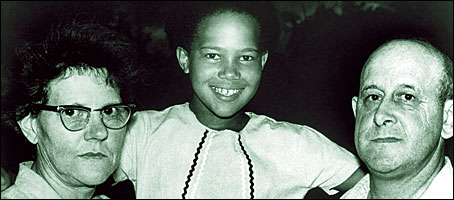| Author |
Message |
    
Tonya
"Cyniquian" Level Poster
Username: Tonya
Post Number: 5600
Registered: 07-2006
Rating: N/A
Votes: 0 (Vote!) | | Posted on Saturday, May 26, 2007 - 12:50 pm: | 



|

Sandra Laing smiles, flanked by her parents in 1966, when they were fighting to reverse a government ruling that changed her racial classification from white to "colored."
AP
IDENTITY CRISIS
Cry, The Beloved Countries
A South African girl is thrown into turmoil when authorities determine she's not white.
Reviewed by Rebecca Walker
Sunday, May 27, 2007; BW08
WHEN SHE WAS WHITE
The True Story of a Family Divided By Race
By Judith Stone
Miramax. 324 pp. $23.95
Sandra Laing, the gentle, brown-skinned woman at the heart of Judith Stone's riveting new book, When She Was White, grew up afflicted with the social stigma and cultural dislocation often experienced by mixed-race people -- even though both her parents were white. Born to middle-class Afrikaaners of European descent, Laing was abruptly expelled from her whites-only school because the principal considered her appearance "definitely that of a person with mixed blood between a white person and a Bantu." She was 10 years old.
Because of Laing's tawny complexion, her mother was accused of having slept with a black man. A blood test did not exclude the paternity of Laing's white father, and he argued that the girl's coloring resulted from latent African genes left over from the era when slavery was practiced in South Africa and interracial sex was common. The apartheid government classified Laing as "colored," and the press seized upon her story. Laing's parents eventually succeeded in Herculean efforts to have her re-classified as white, but not without exposing the family to the cruelty of Afrikaaner nationalists and government bureaus with names such as the Race Classification Appeals Board. In the midst of nationwide ostracism and disregard, it did not occur to Laing's parents to challenge not just the misclassification but apartheid itself.
Laing ended up in a convent school run by Irish nuns. When she fell in love with an older, married black man during long breaks at home, her father threatened to kill them both. Her parents subsequently abandoned her to a life with the black people they accused her of choosing. Penniless and longing for her family home, she tried desperately to maintain contact. Eventually, Laing's mother wrote telling her not to call or visit. Laing never saw her father again.
Over the next three decades, Laing suffered domestic abuse, homelessness, physical illness and the loss of her children to foster care. Because her story symbolized all that was irrational and inhumane about apartheid, her anguish was repeatedly punctuated by the media's voyeuristic interest. But her willingness to discuss her circumstances only caused the rift between her and her family to widen. Her brothers accused her of exploiting her situation to undermine their social position as whites. To this day, they refuse to meet with her.
Laing's story is similar to that of many who straddle racial designations that have more to do with social engineering than with actual differences among human beings. Shame, alienation from family members, memory loss and difficulty in sustaining a stable home are a few of the possible effects of belonging to more than one racial category. Ironically, Laing eventually seems to have found some peace with help from members of the same media that once took part in her objectification. Two journalists in particular helped to fit the pieces of Laing's life together, and as a result of their work to reunite Laing with her estranged mother, she finally felt unburdened. In a moving passage, one of those journalists, Judith Stone, tells of Laing dreaming that she was "laughing and laughing"; she felt "a new space open up in her heart."
Stone, a perceptive essayist and contributing editor of O, Oprah's magazine, entered Laing's life as both a biographer and an unwitting facilitator of her recovery. Stone encouraged Laing to unearth the buried shards of her shattered existence, and consulted with experts on trauma and loss to enhance her understanding of Laing's erratic memory and self-sabotaging behavior. With When She Was White, Stone has contributed to a relatively new genre of postcolonial narrative, in which whites and blacks collaborate in exposing the harm done by colonialism.
Laing's reconnection with her children, a successful marriage with another man and the reunion with her mother after 27 years all serve as testimony to her extraordinary ability to persevere. But her ultimate triumph may lie in the interest taken in her by a British movie producer who optioned her story, paying her enough money to undergo psychotherapy. He also promised to bring Laing's harrowing tale to a wider audience, where it will continue to complicate our ideas about the meaning of skin color. It may even reveal, once and for all, the fallacy of all racial categorizing. ·
Rebecca Walker is the author of "Black, White and Jewish: Autobiography of a Shifting Self."
http://www.washingtonpost.com/wp-dyn/content/article/2007/05/25/AR2007052500051.html |
    
Latina_wi
Regular Poster
Username: Latina_wi
Post Number: 366
Registered: 08-2006
Rating: N/A
Votes: 0 (Vote!) | | Posted on Sunday, May 27, 2007 - 02:12 pm: | 



|
Every time I read this story it amazes me. It highlights the unfair disparities between the different racial groups in south africa through a very interesting, and almost unbelieveable, viewpoint. |
    
Renata
AALBC .com Platinum Poster
Username: Renata
Post Number: 2228
Registered: 08-2005
Rating: N/A
Votes: 0 (Vote!) | | Posted on Sunday, May 27, 2007 - 09:04 pm: | 



|
That's interesting....so when the government insisted that she was black and refused to consider that her entire family was otherwise white, the family just abandoned her and told her to scoot. |
|